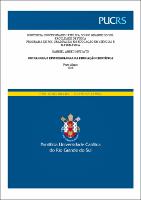| Share record |


|
Please use this identifier to cite or link to this item:
https://tede2.pucrs.br/tede2/handle/tede/8408Full metadata record
| DC Field | Value | Language |
|---|---|---|
| dc.creator | Mussato, Gabriel Abreu | - |
| dc.contributor.advisor1 | Harres, João Batista Siqueira | - |
| dc.date.accessioned | 2019-01-15T15:32:25Z | - |
| dc.date.issued | 2018-08-23 | - |
| dc.identifier.uri | http://tede2.pucrs.br/tede2/handle/tede/8408 | - |
| dc.description.resumo | O objetivo desta pesquisa é analisar as implicações de diferentes pressupostos ontológicos e epistemológicos na educação científica. A análise como um todo foi orientada por quatro Questões Fundamentais. No âmbito da ontologia, são analisadas possíveis respostas para a questão de se há uma fundação para a natureza. No âmbito da epistemologia, são analisadas três questões: a questão ontológica de se existe um mundo independente da mente; a questão epistêmica que aborda o que pode ser conhecido; e a questão semântica que aborda a relação entre linguagem e realidade. A pesquisa divide-se em três etapas, cada qual correspondendo a um capítulo do trabalho. No Capítulo 1, são analisadas e classificadas, em um espectro filosófico, possíveis respostas às Questões Fundamentais. No que se refere à ontologia, foram analisadas posições que afirmam fundações da natureza (fundacionistas), que as negam (niilistas) e que se abstêm na resposta, que, neste contexto, são representadas pela abordagem filosófica budista do Caminho do Meio (Madhyamaka). No âmbito da epistemologia, são analisadas as posições realistas, idealistas e do Caminho do Meio. No Capítulo 2, são avaliadas as possíveis implicações e contribuições que tais pressupostos produzem na educação científica. São abordados temas como: conflitos entre visões de mundo dos estudantes e as visões de mundo científicas; a função dos pressupostos na argumentação e educação científicas; as dificuldades de mudança conceitual dos estudantes; e o papel do conceito de verdade em uma era de pós-verdade. No Capítulo 3, é apresentada uma possível contribuição desta pesquisa para o ensino de Mecânica Quântica, em que se destacam algumas questões passíveis de serem abordadas no decorrer do estudo da teoria. | por |
| dc.description.abstract | The objective of this research is to analyze the implications of different ontological and epistemological premises in science education. The analysis, as a whole, is guided by four Fundamental Questions. Within the scope of ontology, some possible answers have been considered concerning the question of whether nature has a foundation. Within the scope of epistemology, three issues are examined: the ontological perspective questions whether a world exists independently of the mind; the epistemic approach questions what can be known; and the semantic question considers the relations between language and reality. The research is divided into three parts, each of which corresponding to a chapter of this study. In Chapter 1, potential responses to the Fundamental Questions are analyzed and classified according to their philosophical stance. Regarding the ontological thought, we examined the position affirming nature’s foundations (foundationalists), the one denying it (nihilists), and the one which refrains from answering the question, which in this context is represented by the Buddhist philosophical approach of the Middle Way (Madhyamaka). With respect to epistemology, the realist, the idealist and the Middle Way perspectives are analyzed. In Chapter 2, we assess the possible implication and contribution which these premises produce in science education. Various topics are addressed, such as: conflicting world views from the perspective of students and of science, the role of presuppositions in scientific argumentation and education, the students’ difficulties regarding conceptual changes and the role of the concept of truth in the post-truth era. Finally, in Chapter 3 we present a way in which this research may contribute to the teaching of Quantum Mechanics, where we emphasize some questions that can be addressed in the course of the study of theory. | eng |
| dc.description.provenance | Submitted by PPG Educação em Ciências e Matemática ([email protected]) on 2019-01-07T19:23:27Z No. of bitstreams: 1 TESE_FINAL_Gabriel_Mussato-para-homologação.pdf: 1945567 bytes, checksum: 3bf1a192581bccd1e1e685b555a97b34 (MD5) | eng |
| dc.description.provenance | Approved for entry into archive by Caroline Xavier ([email protected]) on 2019-01-15T15:27:04Z (GMT) No. of bitstreams: 1 TESE_FINAL_Gabriel_Mussato-para-homologação.pdf: 1945567 bytes, checksum: 3bf1a192581bccd1e1e685b555a97b34 (MD5) | eng |
| dc.description.provenance | Made available in DSpace on 2019-01-15T15:32:25Z (GMT). No. of bitstreams: 1 TESE_FINAL_Gabriel_Mussato-para-homologação.pdf: 1945567 bytes, checksum: 3bf1a192581bccd1e1e685b555a97b34 (MD5) Previous issue date: 2018-08-23 | eng |
| dc.description.sponsorship | Coordenação de Aperfeiçoamento de Pessoal de Nível Superior - CAPES | por |
| dc.format | application/pdf | * |
| dc.thumbnail.url | http://tede2.pucrs.br:80/tede2/retrieve/173912/TESE_FINAL_Gabriel_Mussato-para-homologa%c3%a7%c3%a3o.pdf.jpg | * |
| dc.language | por | por |
| dc.publisher | Pontifícia Universidade Católica do Rio Grande do Sul | por |
| dc.publisher.department | Escola de Ciências | por |
| dc.publisher.country | Brasil | por |
| dc.publisher.initials | PUCRS | por |
| dc.publisher.program | Programa de Pós-Graduação em Educação em Ciências e Matemática | por |
| dc.rights | Acesso Aberto | por |
| dc.subject | Educação Científica | por |
| dc.subject | Ontologia | por |
| dc.subject | Epistemologia | por |
| dc.subject | Mecânica Quântica | por |
| dc.subject | Fundacionismo | por |
| dc.subject | Realismo | por |
| dc.subject | Idealismo | por |
| dc.subject | Caminho do Meio | por |
| dc.subject.cnpq | CIENCIAS HUMANAS::EDUCACAO | por |
| dc.title | Ontologia e epistemologia na educação científica | por |
| dc.type | Tese | por |
| dc.restricao.situacao | Trabalho não apresenta restrição para publicação | por |
| Appears in Collections: | Programa de Pós-Graduação em Educação em Ciências e Matemática | |
Files in This Item:
| File | Description | Size | Format | |
|---|---|---|---|---|
| TESE_FINAL_Gabriel_Mussato-para-homologação.pdf | TES_GABRIEL_ABREU_MUSSATO_COMPLETO | 1.9 MB | Adobe PDF |  Download/Open Preview |
Items in DSpace are protected by copyright, with all rights reserved, unless otherwise indicated.




